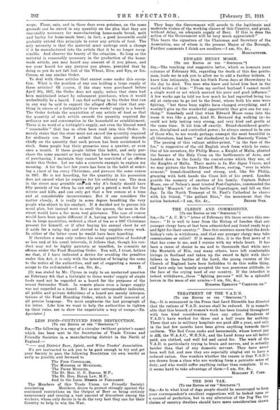EDWARD HENRY MOSSE.
[To THE EDITOR OF THE "SPECTATOR."]
Sie,—The touching and suggestive letter, which so honours your columns of February 9th, regarding the death of this fine gentle- man, leads me to ask you to allow me to add a further tribute. I knew him intimately, from his Sixth Form days at Shrewsbury to the day he died. The man who knew and loved him best in the world writes of him: " From my earliest boyhood I cannot recall a single word or act which marred his pure and good influence." A few weeks ago he told me how much he had regretted being too old at sixty-one to go Out to the front, where both his sons were fighting, "but these busy nights have changed everything, and I wouldn't give up the wonderful opportunity they give one for any- thing." Somebody said that when Edward Mosse came into the -room it was like a great, kind St. Bernard dog walking in—he could not help looking very strong, and very kind and gentle at the same time. It hit him off exactly. Broad-shouldered gentle- ness, disciplined and controlled power; he always seemed to be one of those who, to use words perhaps amongst the most beautiful in all literature, had been " not disobedient to the Heavenly Vision."
The passing of this valiant soldier-priest, " in the face of the foe," is suggestive of the old English stock from which he came. One of his ancestors, Sir Philip Mosse, a Knight of Malta, planted the banner of the Holy Cross on the battlements oT Acre, and handed down to the family the coat-of-arms which they use, of the Knights of Malta. Their motto is In Hoc Signo Vinces, and we may picture the brave Edward Mosse, resting, "ever in white armour," broad-shouldered and strong, and, like Sir Philip, grasping with -both hands the Cross hilt of his sword. London guards the memory of another of his family. Captain Robert Mosse, one of Nelson's most trusted Post-Captains, commanded the flagship ` Monarch ' at the battle of Copenhagen, and fell on that day. In the North Transept of St. Paul's Cathedral he shares with his friend, "the gallant Riou," the monument that the
nation bestowed.—I am, Sir, &c., BRONZE STAR.


























 Previous page
Previous page